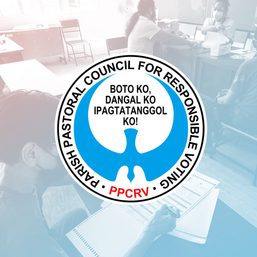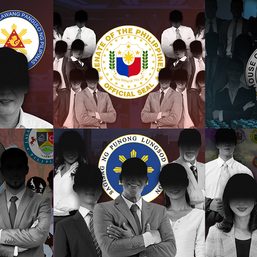SUMMARY
This is AI generated summarization, which may have errors. For context, always refer to the full article.
![[OPINION] Dear political dynasty](https://www.rappler.com/tachyon/2021/02/IMHO-political-dynasty.jpg)
Dear dynasty – you’re not all bad all the time.
Take, for example, the Cayetanos of Taguig. While some politicians mark public property with their names and faces, here the bailiwick is front and center with the ubiquitous “I Love Taguig.” And beneath the occasionally gimmicky viral trappings – a pandemic-era cyber-graduation with toga-toting robots bearing students’ faces! – it is a thriving city with vision, identity, and efficient governance.
The COVID crisis proved Taguig can have quick and clever solutions for almost everything: mobile markets, free testing, quarantine facilities, and just because they are “extra,” health tele-consultations not just for humans but pets, too. And one more thing – the flashy graduation robots? Made by the Taguig Robotics Team, comprised of students from the local science school.
Never to be outdone are the Binays of neighboring Makati. In between spells of corruption allegations and family drama, they consistently keep their city amongst the wealthiest and best run in the country. Its flush coffers and private sector partnerships have allowed them to provide enviable benefits to “Makatizens,” including government-subsidized health care, education, and entertainment, and tech initiatives like public wifi in targeted barangays and cashless government transactions. They are a global “smart city” contender, and soon, the most ambitious of their projects will come to fruition, too: an intra-city subway.
Thank you all for doing your job.
Unfortunately, even the best political dynasties can be problematic.
The painful truth: political family members may be qualified for a position, but they are not always representative. They may be following the letter of the law, but perhaps not its spirit. They may be democratically elected, but by simple existence can be effectively undemocratic. They may mean and even do well, but they usher in hidden dangers corrosive to a mature democracy.
First, let us look at representation. Here’s a simple thought exercise: remember when formal education and the elite workforce was dominated almost entirely by men? This meant that roughly 50% of the population (women or other identifications) had limited input in the running of industry and government. While that is a personal loss to them, it was an even bigger loss to larger society: imagine missing out on 50% of the population’s unique perspectives, solutions, and great ideas! How sooner could we have had new ways to combat cancer or invented computer programming if Marie Curie and Ada Lovelace types only had a voice earlier?
Unheard voices mean lost opportunities to improve society. This is what might happen if we continue filling our government with the same names. Our politics, already so anemic from lack of representation from the mid-to-lower economic classes, loses even more of the dynamism we can expect from diversity. We need experts from a wide range of disciplines and people from all walks of life. We need a variety of hard-earned perspectives borne from experience, not the same insular existence shared by one group of people at a family table.
See, it’s not that political families don’t care about the plight of the so-called common man – it’s just that sometimes, they can’t. It’s a failure of imagination, not a lack of intelligence or empathy.
How many of them, off the top of their heads, can state the contents and price of a market basket, or the average hours spent on a public commute? How many of them can grasp that for so many Filipinos, one medical emergency plunges the entire family into debt? How many can describe food insecurity?
They simply cannot change what they cannot see.
The importance of diversity in governments, schools, and corporations is fundamentally comprehensible because it mirrors nature; the inbred emerge damaged or incompatible with life. Our politics, in a way, is becoming more inbred and is falling sick with it.
Not that this is illegal. (Most) political families operate within the law, in running and holding office one after the other and/or alongside each other. But while that may be so, we must also consider the spirit of the law.
One of the most beautiful things about the law is that, in its barest bones, the common man has a sense of what is just. Juries are components of the legal process in other parts of the world for this reason – there is basic logic, common decency, and fair societal expectations even in people without a law degree.
This is why political dynasties can leave a sour taste in the mouth, even while being technically defensible…because if you go into the more fundamental idea of “fairness,” it gets stickier. As elusive as the concept may be, let’s face it – even a 3-year-old in the playground can understand “Give others a chance.”
This is before we even get into the subject of political dynasties being a barrier to the pursuit of justice, particularly against state crime. By acts of commission, omission or even by, incident – political families don’t create an atmosphere of transparency and impartiality. Would Mayor Child for example, look into the sketchy financials of Daddy Ex-Mayor? Would Baby President pursue investigations into Parent President’s repressive regime? Or even to a smaller degree – will a DUI Political Black Sheep be punished if Mom’s the Gov and Sis is in Congress?
While we’re at it, let’s imagine, say, how President Bongbong Marcos might celebrate the anniversary of the People Power Revolution. Or what will happen to the cases against his mother, or the continuing quest for martial law victims’ recognition and reparations.
He might be objective, he might not. But the point is – by his very existence in a position of power, we do not know how he will impact the allegations against members of his family. He and political scions like him – a certain “Inday” presidentiable with her own powerful and divisive pedigree included – can make people hesitate in investigating or upholding justice. And as human history has shown us so many times…individual courage can fail under such pressure.
Corollary to this, political dynasties are corrosive to a functioning democracy because they chip at our checks and balances, including the separation of powers. And with so much at stake, they are also dangerous, as they create and perpetuate toxic territorialism that sometimes escalates to violence.
Most realistic people agree that political dynasties are more tolerable than ideal, and some semblance of tighter anti-dynasty laws always seem to be in the works. However, they are difficult to define and operationalize, and many efforts have been stunted. Also, understandably, many politicians are hesitant to fire themselves.
No one wants to be unemployed, and I can acknowledge that it doesn’t seem fair to exclude qualified people from certain professions. However, if you are treating the Philippine government as the family business, this is the “tax”: someone in your family has to back down. These are your dues to society; this is the equalizer.
Another reason why a political family may be hesitant to let go is that they fear their foes will take over their job and do worse. That is a reasonable apprehension, too, but let’s look at this conundrum in another way: if your family members are the only ones qualified and decent enough to serve that office, you have failed.
Why? It means you were unable to develop educated and competent public servants beyond yourselves. It means you did not create lasting systems of checks and balances that could withstand challenges. It means, ultimately, that you did not create a healthy government – all you created was a dysfunctional dependency on you. I hope our proud, accomplished political families remember that, like a teacher setting a student free into the world, or a parent releasing their grown child – the final test of true service is in the graceful letting go. – Rappler.com
Isabel Lacson-Estrada is a freelance writer with a Master of Science Degree in Global Affairs from New York University. She is a stay-at-home mom and is underqualified but lucky to have the best job in the world.
Add a comment
How does this make you feel?
![[WATCH] #TheLeaderIWant: Filipino voters sound off on community issues a year before 2025 elections](https://www.rappler.com/tachyon/2024/05/filipino-voters-sound-off-on-community-issues-1.jpg?resize=257%2C257&crop=276px%2C0px%2C720px%2C720px)




![[WATCH] In The Public Square with John Nery: Preloaded elections?](https://www.rappler.com/tachyon/2023/04/In-the-Public-Square-LS-SQ.jpg?resize=257%2C257&crop=414px%2C0px%2C1080px%2C1080px)
![[Newspoint] 19 million reasons](https://www.rappler.com/tachyon/2022/12/Newspoint-19-million-reasons-December-31-2022.jpg?resize=257%2C257&crop=181px%2C0px%2C900px%2C900px)

![[OPINION] The long revolution: Voices from the ground](https://www.rappler.com/tachyon/2022/06/Long-revolution-June-30-2022.jpg?resize=257%2C257&crop=239px%2C0px%2C720px%2C720px)
![[OPINION] I was called a ‘terrorist supporter’ while observing the Philippine elections](https://www.rappler.com/tachyon/2022/06/RT-poster-blurred.jpeg?resize=257%2C257&crop_strategy=attention)
![[Free to Disagree] Boomers, let go please](https://www.rappler.com/tachyon/2024/07/tl-boomers-let-go.jpg?resize=257%2C257&crop=286px%2C0px%2C720px%2C720px)


![[ANALYSIS] The political divorce rocking the Philippines](https://www.rappler.com/tachyon/2024/07/TL-duterte-marcos-china-US-feud-july-4-2024.png?resize=257%2C257&crop=303px%2C0px%2C720px%2C720px)

There are no comments yet. Add your comment to start the conversation.